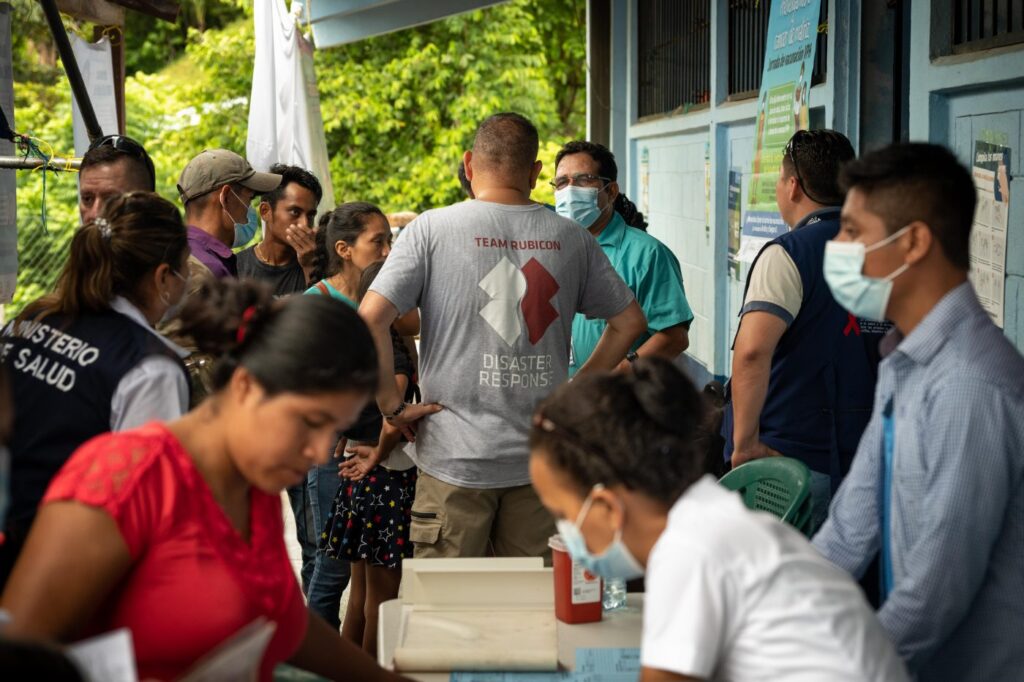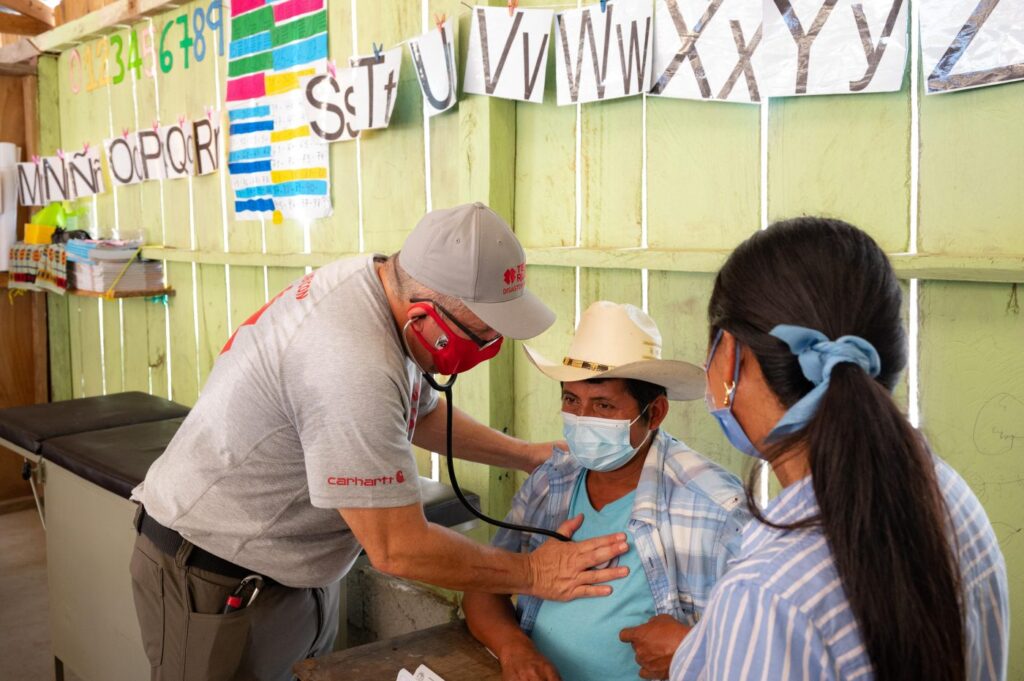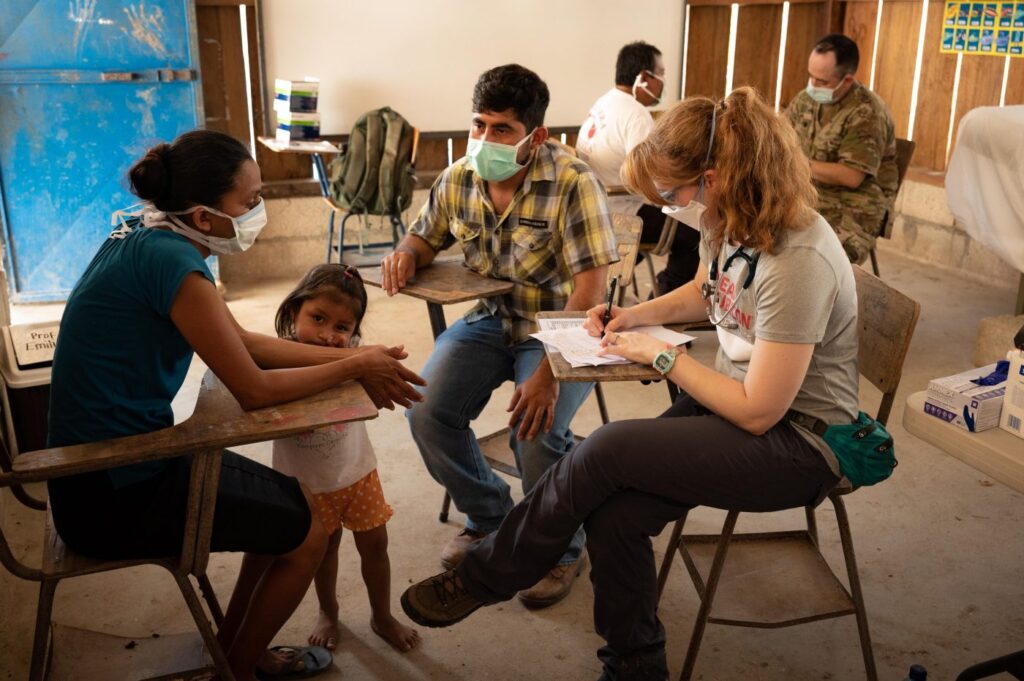Team Rubicon has seven cultural principles, but for me, there is one that singularly defines the organization “Step into the Arena.” It comes from a quote by Teddy Roosevelt, though we often forget that even that snippet is from a much larger speech, “Citizenship in a Republic,” Roosevelt’s 1910 address at the Sorbonne in Paris. More than 100 years later, this timeless exhortation reminds all of us what it means to be a good citizen and, more importantly, that collective action is paramount for humanity.
In the summer of 2022, I was honored and humbled to be asked to join a small team of Greyshirts on serving alongside the U.S. Southern Command, or Southcom, and the Guatemala Ministry of Health provided primary care in rural Guatemala. For more than two weeks, I was able to witness firsthand the selflessness of Greyshirts who stepped into the arena and whose faces were literally “marred by dust and sweat.”

While this operation spanned several months, I joined during the third wave, from July 21 to August 7, in Guatemala. There, the teams set up four two-day clinics in the Petén Department, a region bordered by Belize to the east and Mexico to the north and west. Over those days, medical personnel from Team Rubicon and our partners provided primary care services—talking to individuals, answering their questions, and providing reassurances, as well as basic pharmaceuticals. In the end, we served more than 1,500 patients during the two-week mission.
The majority of patients were women and children, as men were largely unable to attend since they were working on farms and ranches during the day. Lack of resources in the area, combined with the COVID-19 pandemic, meant that many individuals were seeking medical care for the first time in months, if not years. One Team Rubicon doctor learned a patient had a diagnosis of cervical cancer, although no one had ever properly communicated it to her. He was able to have that conversation with the patient and give advice for follow-up care.
We often gripe about the healthcare system in the United States, but the clinics—and the entire mission—put (all of) our American complaints into perspective.
Take the fact that many patients traveled for hours to reach the clinic site, mostly by foot—or by borrowed horse, as in the case of one disabled woman whose family traveled with her for almost three hours to reach the clinic site in Flores de Chiquibul.
Once arriving at the clinic site, such individuals then patiently waited in the hot sun for hours to receive care. It was not unusual for the first patient to arrive at 4:30 a.m., hours before the doors to the clinic formally opened.
Perhaps one of my favorite patient interactions was one I witnessed involving a Kʼicheʼ woman and her family: there are 25 languages spoken in Guatemala, 22 of them are Mayan derivatives, with the Kʼicheʼ language being one of the largest linguistic groups. Since none of our translators spoke Kʼicheʼ, a Southcom linguist translated from English to Spanish, which in turn, the woman’s daughter, who spoke Spanish, translated for her mother. And back again. After receiving care from Team Rubicon, the woman then sang a song to everyone in the room in her native Kʼicheʼ language.
The Ones of the Great Enthusiasms
It wasn’t just the patients who worked to reach us or the Greyshirts I served with who made a mark on me; it was also the partners we served alongside. One of the things that struck me the most was the selflessness of all these individuals—individuals who all have their own lives, families, worries, hopes, and dreams that they put aside in service to the patients they focused on with 100% attention and compassion every day.
For example, I learned that a young linguist who was helping to translate for patients and our Team Rubicon nurse practitioner was from Boulder, Colorado. As we chatted during a break, I asked if he was affected by the previous December’s Marshall Fire, thinking he might have had to evacuate. Instead, he told me that the fire had burned his mom’s ranch, destroyed their family home and livestock, and that a few months later, his father had passed away.

I remarked in a different conversation with another Southcomm member that he was probably looking forward to reuniting with his wife back home after the deployment. He then shared that his wife had recently been diagnosed with terminal cancer and had a short life expectancy. He was excited to return home, he told me, to spend their remaining time together.
Both individuals shared these stories with me while taking a break—their professionalism and focus on the mission at hand made it easy to forget that every individual had their own personal challenges waiting for them back home. Yet they had set them all aside in service to others.
Such selflessness was present everywhere. Take, for instance, the Ministry of Health nurses who traveled to the clinics every day with our convoy, many of whom woke at 1:30 a.m. to travel from their respective homes to our rally point, then returned home late in the evening to care and cook for their own families.
Or, consider the nurse with the Guatemalan Ministry of Health who was performing countless pap smears every day to screen for cervical cancer. Depending on the clinic location, her home was anywhere from two to four hours away. On a few occasions, she simply spent the night sleeping on the examination bed at the clinic site so she could be present the next day for patients. Never mind that the clinic was held at a school without running water, indoor plumbing, or electricity: she was perhaps the happiest, most smiling person at the site every day.
The Hidden Helpers Spending Themselves in Worthy Causes
We often forget that it’s not just our partners in the field who help make a mission successful. Other partners also include the countless individuals who support our team in the field, often out of sight. During this operation, Team Rubicon was billeted at a hotel on the Guatemala–Belize border. Most days, breakfast was prepared before our departure, usually around 4:30 a.m., and then we returned to the hotel for dinner in the evening. After a few days, we realized that the same staff that was serving us in the wee hours of the morning and doing our laundry during the day, was also there late at night, always with a smile on their face.

Operational safety and security are always important to Team Rubicon, a point driven home more so on international missions. Throughout our time in Guatemala, we were escorted by the Guatemalan military anytime we left the hotel to attend a clinic site. On the final night of the operation—the culmination of three deployment waves—the town hosted a celebration and awards dinner. There was a young soldier on duty outside the restaurant all night, standing guard to ensure everyone’s safety. Even though his colleagues were inside eating and relaxing, he never left his post.
The list of stories is endless, but these are a few that highlight how much Team Rubicon relies on our partners in the field for a successful mission, and that behind each of these partner organizations is an individual who has the same shared values as us, even though they may not be wearing a grey shirt. Always, though, no matter their outfit or uniform, it was abundantly clear everyone serving was there to “step into the arena.” They were the ones who, as Roosevelt put it, “actually strive to do the deeds; who knows great enthusiasms, the great devotions; who spends himself in a worthy cause…”
“It is not the critic who counts; not the man who points out how the strong man stumbles, or where the doer of deeds could have done them better. The credit belongs to the man who is actually in the arena, whose face is marred by dust and sweat and blood; who strives valiantly; who errs, who comes short again and again, because there is no effort without error and shortcoming; but who does actually strive to do the deeds; who knows great enthusiasms, the great devotions; who spends himself in a worthy cause; who at the best knows in the end the triumph of high achievement, and who at the worst, if he fails, at least fails while daring greatly, so that his place shall never be with those cold and timid souls who neither know victory nor defeat.” —Theodore Roosevelt, April 10, 1910.



